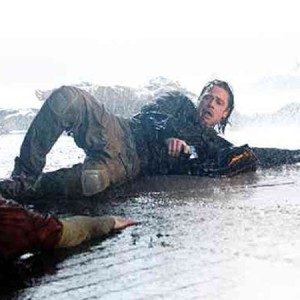We don’t usually enjoy watching movies about zombies, but Brad Pitt’s latest starrer, “World War Z,” was an instructive viewing experience because it showed what more can be done with the genre, aside from terrifying viewers with endless shots of hideous-looking ogres and the ghastly, gap-toothed undead.
The flick even has a “pertinent” plot peg that we can relate to, the all-too-real horrors of pollution, super-viruses, a global pandemic, etc.—in the light of which all those “millions” of digitally generated attacking zombies come off as—not so horribly far-out, after all!
Pitt is cast as a former UN operative who has quit to belatedly focus on his family, but is forcibly conscripted to help find the source of the global contagion—and to arrive at its antidote and cure.
The daunting task becomes practically impossible when the brilliant virologist on top of the mission is killed in a fluke accident, so Pitt’s character, who isn’t a scientist, is obliged to fill in the blank, as best he can.
Official hero
Naturally, since he’s the official hero here, he eventually gets the “impossible” job done, and saves the non-zombie world from total annihilation—but, just barely!
As the film unspooled, we focused, not on the seemingly interminable “parade” of the attacking undead, but on the different ploys and devices that director Marc Forster employed to keep viewers constantly stressed and terrified, despite the eventual predictability of the horrific images thrown at them.
Felicitous storytelling flourishes came few and far between, but little and humongous crises were constantly thought up to reduce viewers to begging, pleading blobs of protoplasm.
“Enough!,” we piteously begged, but the production people knew that we were theirs to do with as they pleased, so they “whipped” us into even more pitiful submission with master strokes and concepts like a chase across Jerusalem, an airplane “suddenly” infested with newly “zombie-fied” passengers—etc.!
This practically “Pavlovian” approach to storytelling (if you keep punishing them, they will plead for even more deliciously empathetic “pain”) may sound cynical and even cruel—but, it’s cruelty with viewers’ tacit “permission”—so, on with the show!
What’s really interesting about “WWZ” is the fact that, after a while, the zombies themselves don’t really figure all that strongly in its storytelling.
Antidote
Yes, they’re always there, in increasing megamillions, but the more dynamic part of the movie’s plotting is how Pitt and the few other surviving good guys finally discover the zombie pandemic’s antidote and cure.
Naturally, we can’t spill the beans for fear that the spoiler will sic a horde of aggrieved cinephiles at us, but we can share that the global problem’s solution is as unexpectedly “small” as the pandemic is huge.
Another intimate element that gives the movie much-needed contract and surcease from its endless visual horrors is the relationship between the members of the hero’s nuclear family, who may often be separated by time and space, but are linked by a steadfast love that strengthens them and enables them to survive the “impossible” ordeal.
Yes, it may look too good to be true, but when it appears like all of humanity is about to expire—even the most implausible way out will do!
